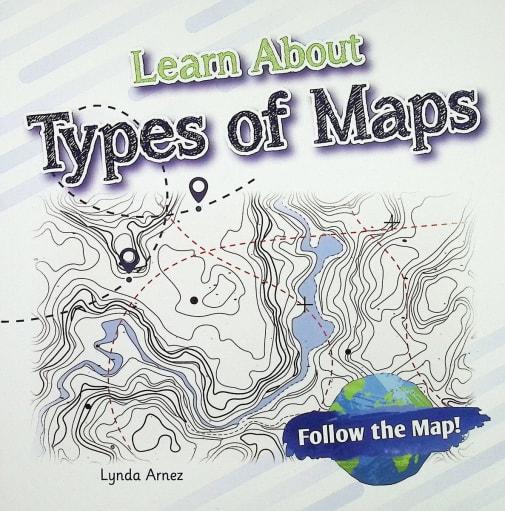Did you know that people were making maps on clay tablets over 4,000 years ago? Cartography, the art of making maps, is fascinating! Learn to read the map key symbols, geographic features, climate zones, themes and more! 24 pgs.sc.
Learn About Types of Maps (Follow the Map!)
SKU
045658
ISBN
9781978535879
Grade PK-3
These icons are designed to help you quickly understand and learn important information about our products.
Teaching Method
Traditional
Teacher-centered curriculum commonly used in classrooms that may include a text, teacher manual, tests, etc.
Charlotte Mason
A methodology based on the work of a 19th century educator who maintained that children learn best from literature (Living Books), not textbooks.
Classical
A methodology based on the Latin Trivium (three stages of learning), including the grammar stage (memorization and facts), logic stage (critical thinking), and rhetoric stage (developing/defending ideas).
Unit Study
A thematic or topical approach centered around one topic that integrates multiple subject areas.
Montessori (Discovery)
A methodology based on the work of a 20th century educator that emphasizes student and sensory-driven discovery learning and real-life applications.
Other
Other methodologies
Religious Content
Secular
Contains content contrary to common Christian beliefs (i.e. evolution).
Neutral
Avoids religious or theoretical topics or presents multiple viewpoints without preference.
Christian/Religious
Faith-based or including instructional religious content.
Learning Modality
Auditory
Learns through listening, talking out loud or reading out loud.
Visual
Learns through seeing, prefers written instructions and visual materials.
Kinesthetic/Tactile (Hands-On)
Learns through moving, doing and touching.
Multi-Sensory
Curriculum that employ a variety of activities/components.
Presentation
Sequential
Curriculum progresses through well-defined learning objectives. Emphasizes mastery before moving to the next topic.
Spiral
Topics and concepts are repeated from level to level, adding more depth at each pass and connecting with review.
Conceptual/Topical
Focus is on the “why,” often with a unifying concept as well as specific skills; coverage may be broader.
Teacher Involvement
Low Teacher Involvement
Student-led materials; parent acts as a facilitator.
Medium Teacher Involvement
A mix of teacher-led time and independent student work.
High Teacher Involvement
Teacher-led lessons; may utilize discussions, hands-on activities and working together.
Additional Materials Required
No other materials needed
Everything you need is included.
Other Materials Required
There are additional required resources that are a separate purchase.
Other Materials Optional
There are additional resources mentioned or recommended but are not absolutely necessary.
Consumable
Consumable
Designed to be written in; not reusable.
Non-Consumable
Not designed to be written in; reusable.
Our Price
$10.35 $10.35 $7.95
Rainbow Savings: $2.40
Description
Publisher's Description of Learn About Types of Maps (Follow the Map!)
Whether you're looking at a paper map or a map online, it's important to
understand how to read it. From weather maps to road maps, these tools
help us better understand the world around us, and especially help us
find where we're going! This volume includes basic map concepts, such as
using map keys, scale, and latitude and longitude, all of which support
lower elementary social studies curricula. Examples and full-color maps
introduce readers to climate maps, population maps, and more!
Category Description for Follow the Map!
Packed with full-color maps, illustrations, and examples on every page, this series of 6 books builds foundational map skills in a fun, easy way! Many kids today rely on technology to tell them where to go, step-by-step and turn-by-turn. Reading maps is becoming a lost art! Each of these books tackles a different map topic—climate zones, latitude and longitude, map keys, cardinal directions, time zones, and types of maps—helping kids to become “map-literate” so they can feel confident in their own skills! Each 24-page book includes a glossary of important terms and suggested resources for more information.
Details
| Product Format: | Paperback |
|---|---|
| Grades: | PK-3 |
| Brand: | Enslow Publishers |
| ISBN: | 9781978535879 |
| Length in Inches: | 7.9375 |
| Width in Inches: | 7.8125 |
| Height in Inches: | 0.0625 |
| Weight in Pounds: | 0.15 |
Videos
Reviews

